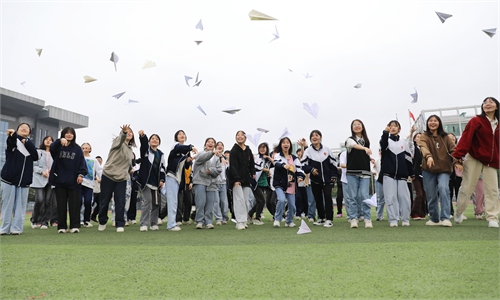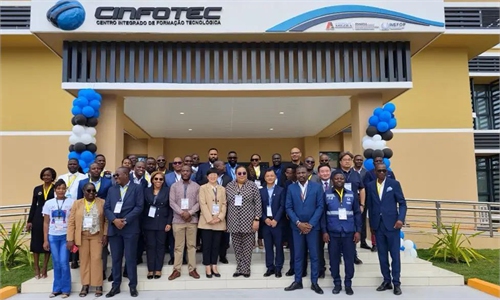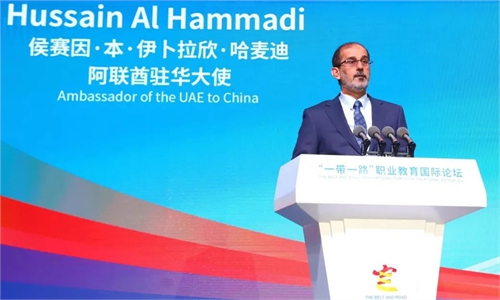IN-DEPTH / IN-DEPTH
Deep focus: Chinese vocational schools help foreign youngsters change life, realize self-fulfillment via international cooperation
Wings of dreams
Editor's Note:
AI, digital life, space travel ... The future is coming at an unimaginable speed.
At this crucial juncture when China has embarked on a new journey to comprehensively build a modern socialist country, such rapid development and transformation not only bring vast opportunities and prospects, but also unpredictable challenges and problems.
These challenges and problems, ranging from the future of human survival, the transformation of local development, to the life and death of a family or a stray animal, could be key topics that trigger social discussion. Each debate surrounding these topics is an inevitable pain point on China's path to pursuing high-quality development.
Against this backdrop, the Global Times has launched the Deep Focus series, focusing on specific issues in current social development. Through detailed investigation and research, we aim to uncover the root causes behind these problems, seek solutions, and engage with relevant parties and sectors to find keys to unlock these complex issues.
In this installment, students from China's Luban Workshop around the world share stories of how the workshops have changed their lives and helped them fulfill themselves.
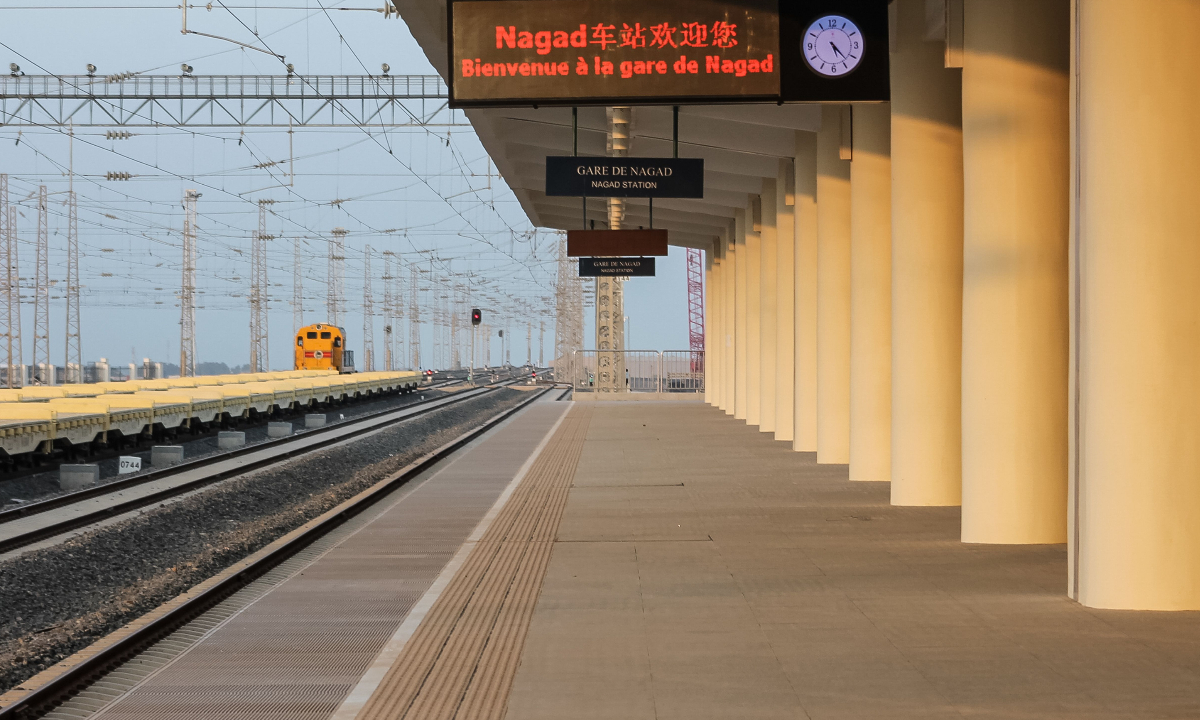
"The Luban Workshop helped me realize my dream, and there is nothing more joyful than seeing dreams come true. This is the most precious gift that China has given to the youth of Djibouti!" said Aisha, 23, in Djibouti.
Aisha is one of the first 24 students to be enrolled at the Djibouti Luban Workshop, which is the first of its kind in Africa. Due to a special affection for railway systems since childhood, Aisha chose the electrical engineering major in college and entered the Luban Workshop to study railway engineering in 2019 after a strict selection process.
Aisha, now a graduate, works as an expert for the Addis Ababa-Djibouti Railway built by Chinese enterprises. He can still recall the excitement he felt when he first entered the Luban Workshop. "It was the first time I had seen the three-dimensional sand table that can reproduce the operation of locomotives on the tracks of the Addis Ababa-Djibouti Railway. I still clearly remember how the teacher demonstrated train guidance to us - 'The train is about to enter the Nagad Station, please be ready to receive the train...' That's the station where I work now!"
The Djibouti Luban Workshop was jointly built by the Tianjin Railway Technical and Vocational College (TRTVC) and the Tianjin First College of Commerce based in North China's Tianjin Municipality, the Djibouti Industrial and Commercial High School, and the China Civil Engineering and Construction Corporation, in 2019. One of the main aims of establishing the workshop was to cultivate local talents for the Addis Ababa-Djibouti Railway constructed by China, the first trans-boundary electrified railway route in Africa and a mega infrastructure project under the China-proposed Belt and Road Initiative (BRI).
"Chinese people often say, 'Give a man a fish and you feed him for a day; teach a man to fish and you feed him for a lifetime.' The Luban Workshop provides an effective way for young people from around the world to develop and enhance their technical skills," director of the TRTVC Yu Zhongwu told the Global Times.
"In Africa specifically, there is an abundance of young labor force along with a high demand for technical talent. Through technical skills training, we can improve the employment capabilities of African youth, enhance their quality of life, and increase their sense of achievement and happiness," Yu noted.
Door to opportunities
Named after Lu Ban, an ancient Chinese woodcraft master, China's Luban Workshops have gained popularity around the world, becoming a focal point of the country's efforts to promote international cooperation in vocational education.
Luo Zhaohui, chairman of the China International Development Cooperation Agency, said that the Luban Workshop concept has become a golden signboard for China's "small but beautiful" international vocational cooperation projects.
Nattawut Thusawut, 26, from central Thailand, is a typical example of how the Luban Workshops can change a person's life.
Thusawut always had a dream to step out of his small home village and build a better life of his own in a bigger world with his own hands and for his grandmother. But the dream seemed hopeless when he was young given his family's poverty.
However, an unexpected door opened to him in 2016 when China's first Luban Workshop was jointly built by the Tianjin Bohai Vocational Technical College (TBVTC) and the Thailand Ayutthaya Technical College.
Through the workshop, Thusawut acquired skills and got the chance to come to China as an overseas student enrolled at the Tianjin Bohai Vocational Technical College.
The workshop changed Thusawut's life by giving him access to not only knowledge, but also practical skills, which enabled him to be more competitive in the labor market. Now, as a manager in a China-invested enterprise in Thailand, Thusawut is living a much better life than he had ever dreamed of.
Eight years have passed and the Thailand Luban workshop has provided education to 1,776 Thailand students and sent more than 360 students to study in China. It has also extended its influence to more ASEAN countries, with exchanges and training sessions for a total of more than 19,700 students and more than 700 teachers, the Global Times learned from the TBVTC on Wednesday.
"Students are proud to study at the Luban Workshop," Mayuree Sriraboot, the principal at the Thailand Ayutthaya Technical College, told People's Daily.
The Luban Workshop in Thailand not only enhances the language and technical abilities of Thai students, but also provides them with broader development opportunities, Mayuree said.
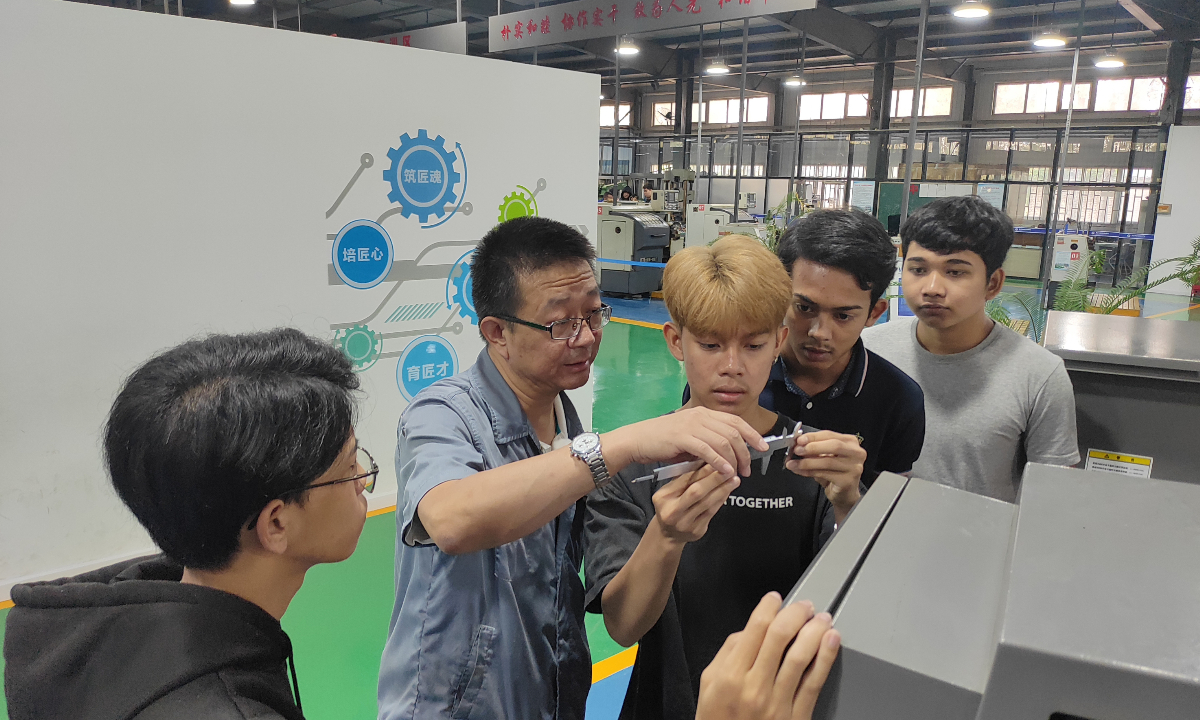
Bridge of communication
The Thai Luban Workshop not only enhances the level of vocational education in Thailand, but also further strengthens educational exchanges and training between Thailand and China, promoting friendship between the two peoples.
Luban workshops, first launched as technical hubs to promote shared development among countries, now also serve as vital bridges for cultural exchanges and the strengthening of people-to-people connections between China and foreign countries.
Nitinun Chomchuen obtained a Chinese government scholarship to study for a master's degree at the Tianjin University. When she graduated in 2018, she learned that the Thailand Luban Workshop was in need of talent. She then applied to work at the TBVTC to support the project.
Now, Chomchuen has been working at the college for more than four years. She has been working hard to promote China-Thailand vocational education cooperation in order to strengthen the friendly relations between China and Thailand and help facilitate exchanges and cooperation between the two countries. Whenever there is an opportunity, she helps Thai students obtain scholarships to study in China.
She told the Global Times that, "over the last few years, I have developed a deep affection for the TBVTC. I am grateful for the opportunity to work here and contribute to building bridges for China-Thailand vocational education exchanges and cooperation."
"I feel that my life is very meaningful. If it weren't for the Luban Workshop project, my life might have taken a different path. My life would have lacked a certain flavor - the flavor of value," she said.
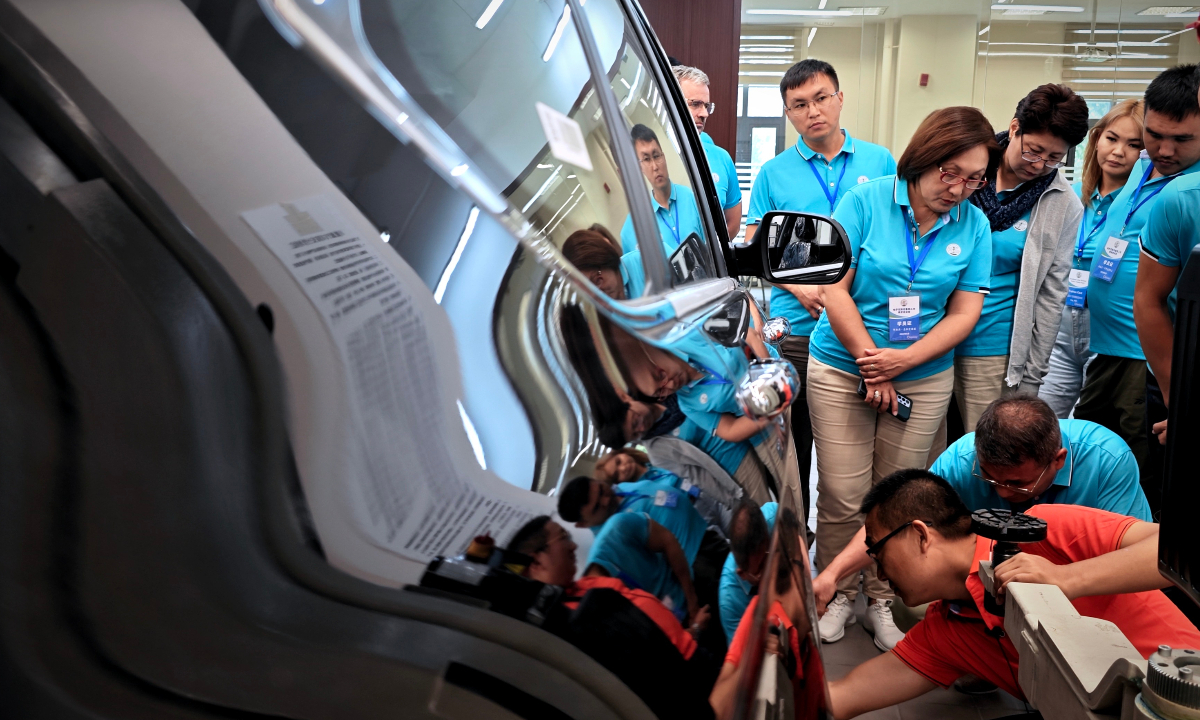
Share of development
Aside from Luban Workshops, China has established other international vocational training institutes such as the Zhenghe College and Silk Road Institute. After years of development, these institutes and projects are not merely providing professional training, but they are playing a vital role in helping developing countries to complete their vocational education systems in an era of rapid technological improvement.
For example, based on the Egyptian Luban Workshop, the Tianjin Light Industry Vocational and Technical College has taken the lead in establishing the African Vocational Education Research Center to serve vocational education cooperation between China and Africa in the future.
Mohamed Moujahid, Deputy Minister of Technical Education of Egypt, told the China Youth Daily that China's vocational education programs have played a demonstrative and driving role in boosting Egypt's vocational education system.
In Kazakhstan, in response to local demand for professional technical talents, the local Luban Workshop has established a "transportation equipment and technology" specialty. After expansion this year, the workshop will further strengthen training courses in new energy vehicles and intelligent connected technology.
Carrying out international cooperation in vocational education can introduce excellent concepts, methods, and curriculum systems from foreign vocational education, and also allow Chinese vocational education concepts and talents to go abroad. Such interactions not only help meet the increasing demand of enterprises for international talents, but also provide talent support for the development of countries along the BRI, Yu Yougen, deputy secretary-general of the China Education Association for International Exchange, said at a forum in April.
With the continuous deepening of opening up, the internationalization of vocational education is an irreversible trend, Zheng Yali, director of Zhejiang University of Finance and Economics, was quoted as saying by Science and Technology Daily.
The deepening development of the BRI, the digital transformation of vocational education, and other factors provide development space for international cooperation in vocational education. In the future, government departments, vocational colleges, and industry organizations should work together to create high-quality international cooperation, strive to provide more targeted and differentiated strategies based on local conditions, and open up a new situation for international cooperation in vocational education, Zheng said.
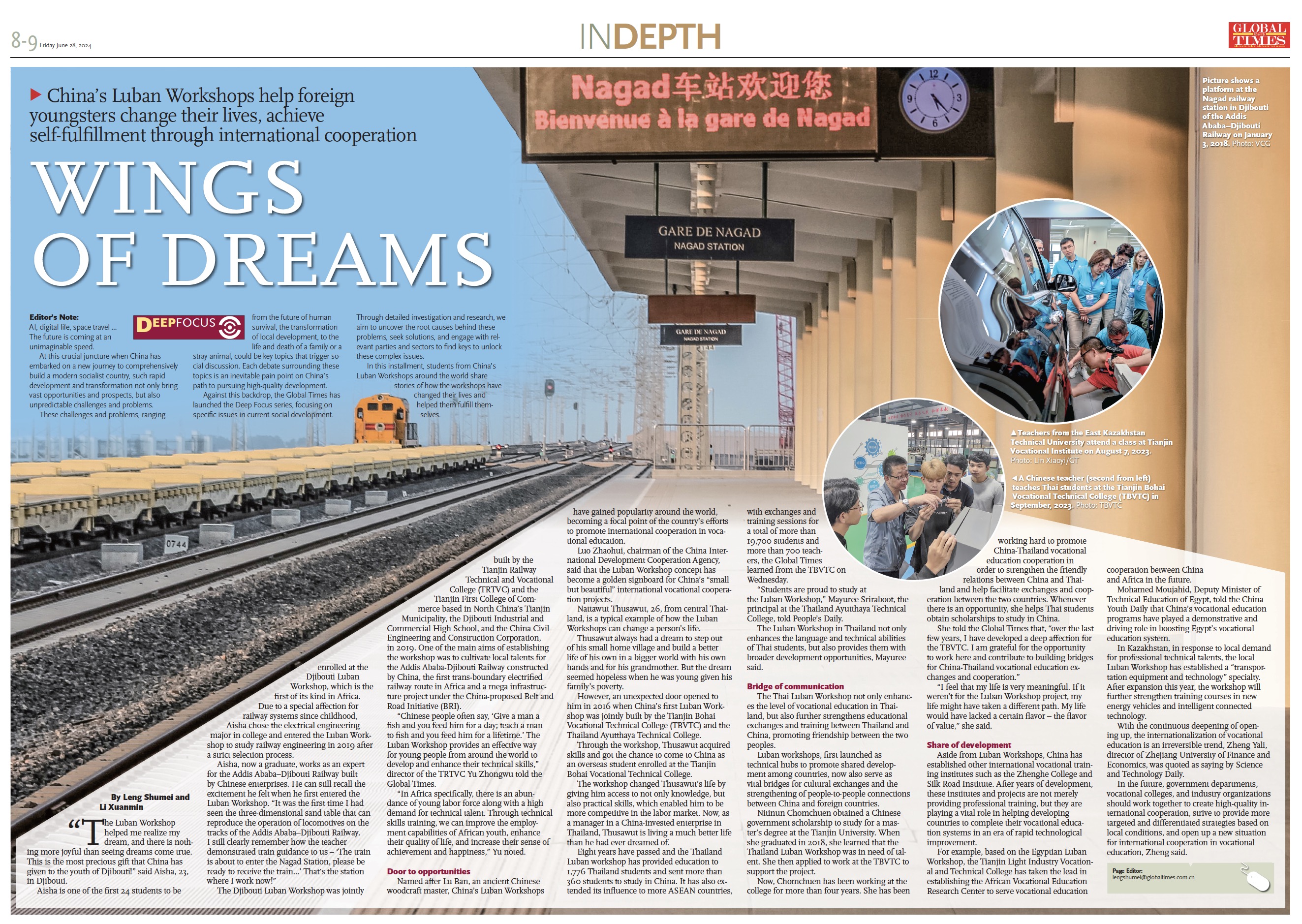
AI, digital life, space travel ... The future is coming at an unimaginable speed.
At this crucial juncture when China has embarked on a new journey to comprehensively build a modern socialist country, such rapid development and transformation not only bring vast opportunities and prospects, but also unpredictable challenges and problems.
These challenges and problems, ranging from the future of human survival, the transformation of local development, to the life and death of a family or a stray animal, could be key topics that trigger social discussion. Each debate surrounding these topics is an inevitable pain point on China's path to pursuing high-quality development.
Against this backdrop, the Global Times has launched the Deep Focus series, focusing on specific issues in current social development. Through detailed investigation and research, we aim to uncover the root causes behind these problems, seek solutions, and engage with relevant parties and sectors to find keys to unlock these complex issues.
In this installment, students from China's Luban Workshop around the world share stories of how the workshops have changed their lives and helped them fulfill themselves.

Picture shows a platform at the Nagad railway station in Djibouti of the Addis Ababa-Djibouti Railway on January 3, 2018. Photo: VCG
"The Luban Workshop helped me realize my dream, and there is nothing more joyful than seeing dreams come true. This is the most precious gift that China has given to the youth of Djibouti!" said Aisha, 23, in Djibouti.
Aisha is one of the first 24 students to be enrolled at the Djibouti Luban Workshop, which is the first of its kind in Africa. Due to a special affection for railway systems since childhood, Aisha chose the electrical engineering major in college and entered the Luban Workshop to study railway engineering in 2019 after a strict selection process.
Aisha, now a graduate, works as an expert for the Addis Ababa-Djibouti Railway built by Chinese enterprises. He can still recall the excitement he felt when he first entered the Luban Workshop. "It was the first time I had seen the three-dimensional sand table that can reproduce the operation of locomotives on the tracks of the Addis Ababa-Djibouti Railway. I still clearly remember how the teacher demonstrated train guidance to us - 'The train is about to enter the Nagad Station, please be ready to receive the train...' That's the station where I work now!"
The Djibouti Luban Workshop was jointly built by the Tianjin Railway Technical and Vocational College (TRTVC) and the Tianjin First College of Commerce based in North China's Tianjin Municipality, the Djibouti Industrial and Commercial High School, and the China Civil Engineering and Construction Corporation, in 2019. One of the main aims of establishing the workshop was to cultivate local talents for the Addis Ababa-Djibouti Railway constructed by China, the first trans-boundary electrified railway route in Africa and a mega infrastructure project under the China-proposed Belt and Road Initiative (BRI).
"Chinese people often say, 'Give a man a fish and you feed him for a day; teach a man to fish and you feed him for a lifetime.' The Luban Workshop provides an effective way for young people from around the world to develop and enhance their technical skills," director of the TRTVC Yu Zhongwu told the Global Times.
"In Africa specifically, there is an abundance of young labor force along with a high demand for technical talent. Through technical skills training, we can improve the employment capabilities of African youth, enhance their quality of life, and increase their sense of achievement and happiness," Yu noted.
Door to opportunities
Named after Lu Ban, an ancient Chinese woodcraft master, China's Luban Workshops have gained popularity around the world, becoming a focal point of the country's efforts to promote international cooperation in vocational education.
Luo Zhaohui, chairman of the China International Development Cooperation Agency, said that the Luban Workshop concept has become a golden signboard for China's "small but beautiful" international vocational cooperation projects.
Nattawut Thusawut, 26, from central Thailand, is a typical example of how the Luban Workshops can change a person's life.
Thusawut always had a dream to step out of his small home village and build a better life of his own in a bigger world with his own hands and for his grandmother. But the dream seemed hopeless when he was young given his family's poverty.
However, an unexpected door opened to him in 2016 when China's first Luban Workshop was jointly built by the Tianjin Bohai Vocational Technical College (TBVTC) and the Thailand Ayutthaya Technical College.
Through the workshop, Thusawut acquired skills and got the chance to come to China as an overseas student enrolled at the Tianjin Bohai Vocational Technical College.
The workshop changed Thusawut's life by giving him access to not only knowledge, but also practical skills, which enabled him to be more competitive in the labor market. Now, as a manager in a China-invested enterprise in Thailand, Thusawut is living a much better life than he had ever dreamed of.
Eight years have passed and the Thailand Luban workshop has provided education to 1,776 Thailand students and sent more than 360 students to study in China. It has also extended its influence to more ASEAN countries, with exchanges and training sessions for a total of more than 19,700 students and more than 700 teachers, the Global Times learned from the TBVTC on Wednesday.
"Students are proud to study at the Luban Workshop," Mayuree Sriraboot, the principal at the Thailand Ayutthaya Technical College, told People's Daily.
The Luban Workshop in Thailand not only enhances the language and technical abilities of Thai students, but also provides them with broader development opportunities, Mayuree said.

A Chinese teacher (second from left) has class for Thainland students at the Tianjin Bohai Vocational Technical College (TBVTC) in September 2023. Photo: TBVTC
Bridge of communication
The Thai Luban Workshop not only enhances the level of vocational education in Thailand, but also further strengthens educational exchanges and training between Thailand and China, promoting friendship between the two peoples.
Luban workshops, first launched as technical hubs to promote shared development among countries, now also serve as vital bridges for cultural exchanges and the strengthening of people-to-people connections between China and foreign countries.
Nitinun Chomchuen obtained a Chinese government scholarship to study for a master's degree at the Tianjin University. When she graduated in 2018, she learned that the Thailand Luban Workshop was in need of talent. She then applied to work at the TBVTC to support the project.
Now, Chomchuen has been working at the college for more than four years. She has been working hard to promote China-Thailand vocational education cooperation in order to strengthen the friendly relations between China and Thailand and help facilitate exchanges and cooperation between the two countries. Whenever there is an opportunity, she helps Thai students obtain scholarships to study in China.
She told the Global Times that, "over the last few years, I have developed a deep affection for the TBVTC. I am grateful for the opportunity to work here and contribute to building bridges for China-Thailand vocational education exchanges and cooperation."
"I feel that my life is very meaningful. If it weren't for the Luban Workshop project, my life might have taken a different path. My life would have lacked a certain flavor - the flavor of value," she said.

Teachers from the East Kazakhstan Technical University attend a theory lesson at Tianjin Vocational Institute on August 7, 2023. Photo: Lin Xiaoyi/GT
Share of development
Aside from Luban Workshops, China has established other international vocational training institutes such as the Zhenghe College and Silk Road Institute. After years of development, these institutes and projects are not merely providing professional training, but they are playing a vital role in helping developing countries to complete their vocational education systems in an era of rapid technological improvement.
For example, based on the Egyptian Luban Workshop, the Tianjin Light Industry Vocational and Technical College has taken the lead in establishing the African Vocational Education Research Center to serve vocational education cooperation between China and Africa in the future.
Mohamed Moujahid, Deputy Minister of Technical Education of Egypt, told the China Youth Daily that China's vocational education programs have played a demonstrative and driving role in boosting Egypt's vocational education system.
In Kazakhstan, in response to local demand for professional technical talents, the local Luban Workshop has established a "transportation equipment and technology" specialty. After expansion this year, the workshop will further strengthen training courses in new energy vehicles and intelligent connected technology.
Carrying out international cooperation in vocational education can introduce excellent concepts, methods, and curriculum systems from foreign vocational education, and also allow Chinese vocational education concepts and talents to go abroad. Such interactions not only help meet the increasing demand of enterprises for international talents, but also provide talent support for the development of countries along the BRI, Yu Yougen, deputy secretary-general of the China Education Association for International Exchange, said at a forum in April.
With the continuous deepening of opening up, the internationalization of vocational education is an irreversible trend, Zheng Yali, director of Zhejiang University of Finance and Economics, was quoted as saying by Science and Technology Daily.
The deepening development of the BRI, the digital transformation of vocational education, and other factors provide development space for international cooperation in vocational education. In the future, government departments, vocational colleges, and industry organizations should work together to create high-quality international cooperation, strive to provide more targeted and differentiated strategies based on local conditions, and open up a new situation for international cooperation in vocational education, Zheng said.

Wings of dreams

